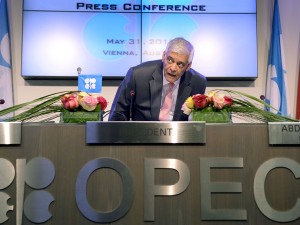
Secretary General of OPEC Abdalla Salem El-Badri of Libya arrives for a news conference after a meeting of the Organization of the Petroleum Exporting Countries, OPEC, at their headquarters in Vienna, Austria, Friday, May. 31, 2013. OPEC oil ministers have decided to keep the organization’s output target at 30 million barrels a day. The decision of the 12-nation oil cartel was expected. The price for internationally traded benchmark oil is over US dollar 100 barrels a day, which is a level most OPEC countries are happy with. AP
VIENNA — Opec kept its world oil demand forecast for 2013 virtually unchanged in its latest update on Tuesday, but tipped downward revisions given the deteriorating economic climate.
The Organization of Petroleum Exporting Countries (Opec) said it expected world demand this year to reach 89.65 million barrels per day (mbpd), a slight drop from the forecast of 89.66 mbpd in its previous monthly report.
This would represent a rise of 780,000 bpd from 2012 oil demand, said the cartel which pumps about 35 percent of the world’s crude.
Most of the increased demand is due to China and other countries not in the OECD club of advanced economies.
But Opec warned “the current forecast is subject to downward revisions not only in the OECD but also in emerging economies.”
The latest Chinese manufacturing and export data raised concerns about a slowdown in Chinese growth, while growth in advanced economies is also expected to be lower than initially expected.
The Opec report noted that oil demand from debt crisis-wracked Europe declined for the 20th straight month in April.
“General expectations for the region’s oil consumption during 2013 have once more weakened since last month’s projections,” said Opec.
Despite concerns about weakening global demand for oil, the cartel decided at its latest ministerial meeting at the end of last month to keep its output ceiling unchanged at 30 mbpd as the price per barrel of crude has hovered around $100.
However it warned it stood ready to act to support the price of oil.
The report, citing non-Opec sources, noted that international sanctions were having an impact on Iran’s oil output, which fell to 2.64 mbpd in May, down from a level of 3.63 mbpd in 2011.
The International Energy Agency, the energy analysis arm of the 34-nation Organization for Economic Cooperation and Development (OECD), releases its updated oil market forecasts on Wednesday.


